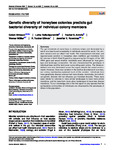Genetic diversity of honeybee colonies predicts gut bacterial diversity of individual colony members
| dc.contributor.author | Bridson, C | |
| dc.contributor.author | Vellaniparambil, L | |
| dc.contributor.author | Antwis, RE | |
| dc.contributor.author | Müller, W | |
| dc.contributor.author | Gilman, RT | |
| dc.contributor.author | Rowntree, Jennifer | |
| dc.date.accessioned | 2022-08-25T14:02:20Z | |
| dc.date.issued | 2022-08-03 | |
| dc.identifier.issn | 1462-2920 | |
| dc.identifier.issn | 1462-2920 | |
| dc.identifier.uri | http://hdl.handle.net/10026.1/19582 | |
| dc.description.abstract |
<jats:title>Summary</jats:title><jats:p>The gut microbiota of social bees is relatively simple and dominated by a set of core taxa found consistently in individuals around the world. Yet, variation remains and can affect host health. We characterized individual‐ and regional‐scale variation in honeybee (<jats:italic>Apis mellifera</jats:italic>) gut microbiota from 64 colonies in North‐West England by sequencing the V4 region of the 16S rRNA gene and asked whether microbiota were influenced by host genotype and landscape composition. We also characterized the genotypes of individual bees and the land cover surrounding each colony. The literature‐defined core taxa dominated across the region despite the varied environments. However, there was variation in the relative abundance of core taxa, and colony membership explained much of this variation. Individuals from more genetically diverse colonies had more diverse microbiotas, but individual genetic diversity did not influence gut microbial diversity. There were weak trends for colonies in more similar landscapes to have more similar microbiota, and for bees from more urban landscapes to have less diverse microbiota. To our knowledge, this is the first report for any species that the gut bacterial communities of individuals are influenced by the genotypes of others in the population.</jats:p> | |
| dc.format.extent | 5643-5653 | |
| dc.format.medium | Print-Electronic | |
| dc.language | en | |
| dc.language.iso | eng | |
| dc.publisher | Society for Applied Microbiology | |
| dc.subject | Bees | |
| dc.subject | Animals | |
| dc.subject | RNA, Ribosomal, 16S | |
| dc.subject | Gastrointestinal Microbiome | |
| dc.subject | Bacteria | |
| dc.subject | Microbiota | |
| dc.subject | Genetic Variation | |
| dc.title | Genetic diversity of honeybee colonies predicts gut bacterial diversity of individual colony members | |
| dc.type | journal-article | |
| dc.type | Journal Article | |
| dc.type | Research Support, Non-U.S. Gov't | |
| plymouth.author-url | https://www.webofscience.com/api/gateway?GWVersion=2&SrcApp=PARTNER_APP&SrcAuth=LinksAMR&KeyUT=WOS:000851501000001&DestLinkType=FullRecord&DestApp=ALL_WOS&UsrCustomerID=11bb513d99f797142bcfeffcc58ea008 | |
| plymouth.issue | 12 | |
| plymouth.volume | 24 | |
| plymouth.publication-status | Published | |
| plymouth.journal | Environmental Microbiology | |
| dc.identifier.doi | 10.1111/1462-2920.16150 | |
| plymouth.organisational-group | /Plymouth | |
| plymouth.organisational-group | /Plymouth/Faculty of Science and Engineering | |
| plymouth.organisational-group | /Plymouth/Faculty of Science and Engineering/School of Biological and Marine Sciences | |
| plymouth.organisational-group | /Plymouth/Users by role | |
| plymouth.organisational-group | /Plymouth/Users by role/Academics | |
| dc.publisher.place | England | |
| dcterms.dateAccepted | 2022-07-22 | |
| dc.rights.embargodate | 2022-8-26 | |
| dc.identifier.eissn | 1462-2920 | |
| dc.rights.embargoperiod | Not known | |
| rioxxterms.versionofrecord | 10.1111/1462-2920.16150 | |
| rioxxterms.licenseref.uri | http://www.rioxx.net/licenses/all-rights-reserved | |
| rioxxterms.licenseref.startdate | 2022-08-03 | |
| rioxxterms.type | Journal Article/Review |


